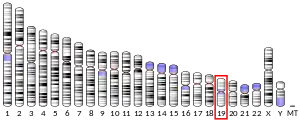PSG4
Pregnancy-specific beta-1-glycoprotein 4 is a protein that in humans is encoded by the PSG4 gene.[3][4]
| PSG4 | |||||||||||||||||||||||||||||||||||||||||||||||||||
|---|---|---|---|---|---|---|---|---|---|---|---|---|---|---|---|---|---|---|---|---|---|---|---|---|---|---|---|---|---|---|---|---|---|---|---|---|---|---|---|---|---|---|---|---|---|---|---|---|---|---|---|
| Identifiers | |||||||||||||||||||||||||||||||||||||||||||||||||||
| Aliases | PSG4, PSG9, PSBG-4, PSBG-9, pregnancy specific beta-1-glycoprotein 4 | ||||||||||||||||||||||||||||||||||||||||||||||||||
| External IDs | OMIM: 176393 HomoloGene: 130509 GeneCards: PSG4 | ||||||||||||||||||||||||||||||||||||||||||||||||||
| |||||||||||||||||||||||||||||||||||||||||||||||||||
| |||||||||||||||||||||||||||||||||||||||||||||||||||
| |||||||||||||||||||||||||||||||||||||||||||||||||||
| Wikidata | |||||||||||||||||||||||||||||||||||||||||||||||||||
| |||||||||||||||||||||||||||||||||||||||||||||||||||
References
- GRCh38: Ensembl release 89: ENSG00000243137 - Ensembl, May 2017
- "Human PubMed Reference:". National Center for Biotechnology Information, U.S. National Library of Medicine.
- Zimmermann W, Weiss M, Thompson JA (Oct 1989). "cDNA cloning demonstrates the expression of pregnancy-specific glycoprotein genes, a subgroup of the carcinoembryonic antigen gene family, in fetal liver". Biochem Biophys Res Commun. 163 (3): 1197–209. doi:10.1016/0006-291X(89)91105-4. PMID 2783133.
- "Entrez Gene: PSG4 pregnancy specific beta-1-glycoprotein 4".
Further reading
- Thompson J, Koumari R, Wagner K, et al. (1990). "The human pregnancy-specific glycoprotein genes are tightly linked on the long arm of chromosome 19 and are coordinately expressed". Biochem. Biophys. Res. Commun. 167 (2): 848–59. CiteSeerX 10.1.1.655.1870. doi:10.1016/0006-291X(90)92103-7. PMID 1690992.
- Chan WY, Zheng QX, McMahon J, Tease LA (1991). "Characterization of new members of the pregnancy-specific beta 1-glycoprotein family". Mol. Cell. Biochem. 106 (2): 161–70. doi:10.1007/BF00230182. PMID 1922019. S2CID 21581759.
- Barnett TR, Pickle W, Elting JJ (1991). "Characterization of two new members of the pregnancy-specific beta 1-glycoprotein family from the myeloid cell line KG-1 and suggestion of two distinct classes of transcription unit". Biochemistry. 29 (44): 10213–8. doi:10.1021/bi00496a009. PMID 2271648.
- "The human pregnancy-specific glycoprotein genes are tightly linked on the long arm of chromosome 19 and are coordinately expressed". Biochem. Biophys. Res. Commun. 168 (3): 1325–1327. 1990. doi:10.1016/0006-291X(90)91174-Q. PMID 2346490.
- Thompson JA, Mauch EM, Chen FS, et al. (1989). "Analysis of the size of the carcinoembryonic antigen (CEA) gene family: isolation and sequencing of N-terminal domain exons". Biochem. Biophys. Res. Commun. 158 (3): 996–1004. CiteSeerX 10.1.1.657.2780. doi:10.1016/0006-291X(89)92821-0. PMID 2537643.
- Chan WY, Borjigin J, Zheng QX, Shupert WL (1988). "Characterization of cDNA encoding human pregnancy-specific beta 1-glycoprotein from placenta and extraplacental tissues and their comparison with carcinoembryonic antigen". DNA. 7 (8): 545–55. doi:10.1089/dna.1.1988.7.545. PMID 3180995.
- Teglund S, Zhou GQ, Hammarström S (1995). "Characterization of cDNA encoding novel pregnancy-specific glycoprotein variants". Biochem. Biophys. Res. Commun. 211 (2): 656–64. doi:10.1006/bbrc.1995.1862. PMID 7794280.
- Olsen A, Teglund S, Nelson D, et al. (1995). "Gene organization of the pregnancy-specific glycoprotein region on human chromosome 19: assembly and analysis of a 700-kb cosmid contig spanning the region". Genomics. 23 (3): 659–68. doi:10.1006/geno.1994.1555. PMID 7851895.
- Kimoto Y (1998). "A single human cell expresses all messenger ribonucleic acids: the arrow of time in a cell". Mol. Gen. Genet. 258 (3): 233–9. doi:10.1007/s004380050727. PMID 9645429. S2CID 11818700.
- Dias Neto E, Correa RG, Verjovski-Almeida S, et al. (2000). "Shotgun sequencing of the human transcriptome with ORF expressed sequence tags". Proc. Natl. Acad. Sci. U.S.A. 97 (7): 3491–6. Bibcode:2000PNAS...97.3491D. doi:10.1073/pnas.97.7.3491. PMC 16267. PMID 10737800.
- Strausberg RL, Feingold EA, Grouse LH, et al. (2003). "Generation and initial analysis of more than 15,000 full-length human and mouse cDNA sequences". Proc. Natl. Acad. Sci. U.S.A. 99 (26): 16899–903. Bibcode:2002PNAS...9916899M. doi:10.1073/pnas.242603899. PMC 139241. PMID 12477932.
This article is issued from Wikipedia. The text is licensed under Creative Commons - Attribution - Sharealike. Additional terms may apply for the media files.

